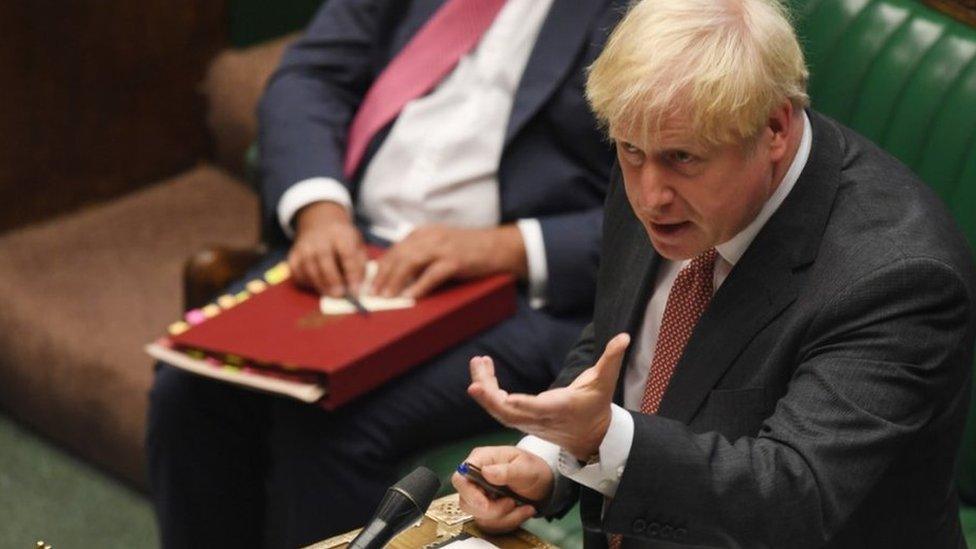Brexit: What are the Internal Market Bill and the Northern Ireland Protocol
- Published
- comments

A majority of MPs have voted to move forward with Boris Johnson's new Brexit bill - despite anger that the rules would break international law.
Politicians in the House of Commons were asked to vote on a bill called the Internal Market Bill. The first vote is a general vote in favour before the bill is looked at in detail.
What is the Internal Market Bill?
The UK left the EU on 31 January, but the two sides had until the end of the year to come to an agreement on how they would work with each other on things such as trade in the future.
They had already worked out some of the details and they were contained in what was called a Withdrawal Agreement, and it was signed by both the UK and the EU.
But the Internal Market Bill is controversial because it goes against some of the things in the Withdrawal Agreement.
In the Withdrawal Agreement, there was something called the Northern Ireland Protocol. Northern Ireland has a border with the Republic of Ireland, which is in the EU.
Part of the Withdrawal Agreement had to work out how things like trade and border control would work between Northern Ireland and the rest of the UK.
It also said border issues affecting Northern Ireland and the Republic of Ireland must be agreed by the UK and the EU together.
But the Internal Market Bill changes that, and says the UK can make the law itself.
A government spokesman said it was vital the bill becomes law by the end of the year when EU law will cease to have effect in the UK.
"It will protect the territorial integrity of the UK and the peace in Northern Ireland, safeguarding trade and jobs across all four corners of the UK following the end of the transition period," he said.
Why is the Irish border an issue?
The border between Northern Ireland and the Republic of Ireland has been at the centre of Brexit negotiations
The border is a sensitive issue because of the history of Northern Ireland. The Good Friday Agreement, which brought peace to that part of the UK, included the removal of visible signs of the border.
The Northern Ireland Protocol in the Withdrawal Agreement avoided a 'hard' border but it does mean future trade between Northern Irish companies and the rest of the UK could be more difficult.
One of the reasons why the UK wants to introduce the new bill is to make it easier for Northern Irish companies to transport goods to Great Britain.
The Northern Ireland Protocol is designed to prevent a hard border in Ireland - or even any new checks at the Irish border.
It does this by effectively keeping Northern Ireland in the EU's single market for goods.
It will mean products entering Northern Ireland from the rest of the UK will be subject to new checks and control - the so-called Irish Sea border.
What these checks will look like needs to be agreed by the EU and UK and are being negotiated alongside the trade talks.
What have people been saying about it?
The government has admitted that its plan to change the special Brexit arrangements for Northern Ireland will break international law. That's because it would be ignoring the Withdrawal Agreement it signed.
The Northern Ireland secretary Brandon Lewis, recently told the House of Commons that the law would only be broken "in a very specific and limited way".
The EU has warned the UK that it could face legal action if it does not get rid of controversial elements of the Internal Market Bill by the end of the month.
Downing Street says the bill is a safety net, in case talks to work out details of the Northern Ireland Protocol fail.
Justice Secretary Robert Buckland said the UK would only use the powers in the bill if the two sides could not reach agreement in another way, and if the EU then went on to act in an "unreasonable" way.
Northern Ireland's political parties are divided over the bill. Some support the idea, saying the EU cannot be allowed to force an economic border between Northern Ireland and the rest of the UK, but don't support breaking international law to achieve it.
Others have criticised the British government for going back on previous commitments.
- Published10 September 2020
- Published31 January 2020
- Published3 April 2019
